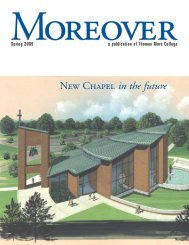Curriculum Map - Thomas More College
Curriculum Map - Thomas More College
Curriculum Map - Thomas More College
Create successful ePaper yourself
Turn your PDF publications into a flip-book with our unique Google optimized e-Paper software.
<strong>Thomas</strong> <strong>More</strong> <strong>College</strong> <strong>Curriculum</strong> <strong>Map</strong>s<br />
Semester:<br />
SELECTED PROGRAM OUTCOMES<br />
Dept: Theatre<br />
Degree: Bachelor of Arts<br />
Theatre Courses<br />
Applied experience and<br />
knowledge in all aspects<br />
of Theatre<br />
Development of Critical<br />
Thinking and Leadership<br />
skills<br />
Students will be able to<br />
work collaboratively in<br />
the creation of theatre<br />
Students will be able to<br />
critically analyse and<br />
contextualise dramatic<br />
literature<br />
Students will develop an<br />
understanding and<br />
appreciation for the<br />
contributions of the arts<br />
to community and<br />
society at large.<br />
(1) Outcome<br />
Statement<br />
(E,I)<br />
(2) Level<br />
(I, E, R, A)<br />
(3)<br />
Demonstrate<br />
(T) (W) (P)<br />
(1) Outcome<br />
Statement<br />
(E,I)<br />
(2) Level<br />
(I, E, R, A)<br />
(3)<br />
Demonstrate<br />
(T) (W) (P)<br />
(1) Outcome<br />
Statement<br />
(E,I)<br />
(2) Level<br />
(I, E, R, A)<br />
(3)<br />
Demonstrate<br />
(T) (W) (P)<br />
(1) Outcome<br />
Statement<br />
(E,I)<br />
(2) Level<br />
(I, E, R, A)<br />
(3)<br />
Demonstrate<br />
(T) (W) (P)<br />
(1) Outcome<br />
Statement<br />
(E,I)<br />
(2) Level<br />
(I, E, R, A)<br />
(3)<br />
Demonstrate<br />
(T) (W) (P)<br />
(1) Outcome<br />
Statement<br />
(E,I)<br />
(2) Level<br />
(I, E, R, A)<br />
(3)<br />
Demonstrate<br />
(T) (W) (P)<br />
THR 105: Introduction to Theatre<br />
THR 205: Acting I<br />
THR 206: Acting II<br />
THR 207: Theatre Production<br />
THR 301: History of Theatre I<br />
THR 302: History of Theatre II<br />
THR 398: Professional Preparation<br />
THR 401: Directing I<br />
THR 402: Directing II<br />
THR 425: Dramatic Design<br />
THR 498: Senior Experience<br />
Dramatic Literature: 12 hours<br />
E I T, W I I W E I P, W I I W, T E I, E T, W<br />
E I W, P I I P, W E E, R P, W E I , R W, P I I W<br />
E E, R W, P I I P, W E E,, R, A P, W E I , R W, P I I W<br />
E I P I I P E I, R P I I P<br />
I R W, T, O I R W, T E R T, O E R T, W<br />
I R W, T, O I R W, T E R T, D E R T, W<br />
E A W, O I R W, O I A O I A P E A W, O<br />
E R P, W, O E R W I E P, O E A W, P, O E A W, O<br />
E A P, W, O E A W, P E A P, O E A W, P, O E A W, O<br />
E A P E A P E A P, O E A P, O<br />
E A P, W E A P E A P E A P, W I A P<br />
ENG 331: Shakespeare<br />
ENG 371: Development of Drama I<br />
ENG 372: Development of Drama II<br />
ENG 376: Modern Drama<br />
Theatre Electives: 6 hours<br />
E R D, W X X X E R T, W, D E E T, W, D<br />
I R W, T X X X E R T, W, D E R T, W, D<br />
I R W, T X X X E R T, W, D E R T, W, D<br />
I R D, T X X X E R T, W, D E R T, W, D<br />
THR 208: Oral Interpretation see COM 208<br />
THR 230: Stage Makeup<br />
E A P X X X I I P X X X<br />
THR 202/203/204 Acting Lab<br />
E A P I R P E A P E R P I E P<br />
THR 211/212/213 Production Lab<br />
E A P I R P E A P E R P I E P<br />
THR 209: Mime and Clowning<br />
E A P, W I R P, D E A P, D I R D, P, W E R D, W, P<br />
THR 210: Integrated Movement<br />
E E, R W, P, D I E D, P I R D, W<br />
THR 305: Playwriting<br />
E A W, D I R D, W E R D, W E A D, W<br />
THR 320 Advanced Acting<br />
E A W, P I I P, W E E,, R, A P, W E A W, P I R W<br />
THR 330 Creative Dramatics<br />
E R W, P, T E R P, O I R P, D E R P E R D<br />
THR 356: Theaching Communication and Theatre in the Secondary Schools-See COM 356<br />
Semester:
<strong>Thomas</strong> <strong>More</strong> <strong>College</strong><br />
<strong>Curriculum</strong> <strong>Map</strong>s Legend<br />
1. OUTCOME STATEMENT (Column 1):<br />
The program outcome is (E) EXPLICITY or (I) IMPLICITLY stated in the course syllabus as being one of learning outcomes for this<br />
course.<br />
2. LEVEL OF CONTENT DELIVERY (Column 2):<br />
(I) INTRODUCES- Students are not expected to be familiar with the content or skill at the collegiate or graduate level. Instruction and<br />
learning activities focus on basic knowledge, skills, and/or competencies and an entry-level complexity.<br />
(E) EMPHASIZES- Students are expected to possess a basic knowledge and familiarity with the content or skills at the collegiate or<br />
graduate level. Instruction and learning concentrates on enhancing and strengthening knowledge, skills, and expanding complexity.<br />
(R) REINFORCES- Students are expected to possess a strong foundation in the knowledge, skill, or competency at the collegiate or<br />
graduate level. Instructional and learning activities continue to build upon previous competencies and increased complexity.<br />
(A) APPLIES- Students are expected to possess an advanced level of knowledge, skill, or competency at the collegiate or graduate<br />
level. Instructional and learning activities focus on the use of the content or skills in multiple contexts and at multiple levels of<br />
complexity.<br />
3. DEMONSTRATION OF LEARNING (Column 3):<br />
Students are asked to demonstrate their learning on the outcome through tests (T), written work (W), oral presentations (O), and/or<br />
projects (P) and are provided with formal feedback. In some cases, individual departments have tailored this legend to include<br />
discipline-specific learning outcomes.


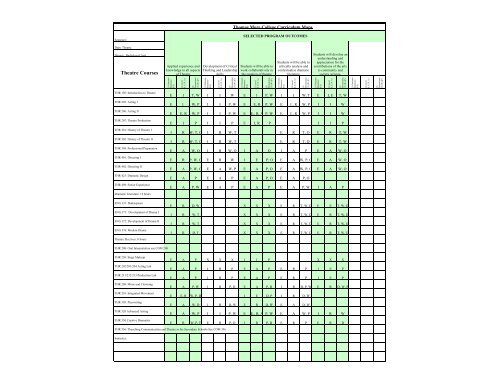
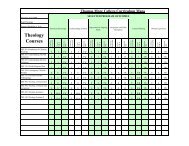


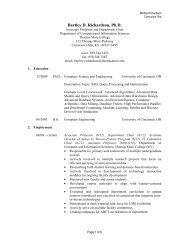
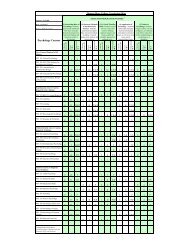

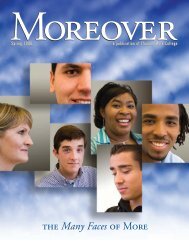
![MOREOVER [Fall 2011] - Thomas More College](https://img.yumpu.com/4921303/1/190x245/moreover-fall-2011-thomas-more-college.jpg?quality=85)

